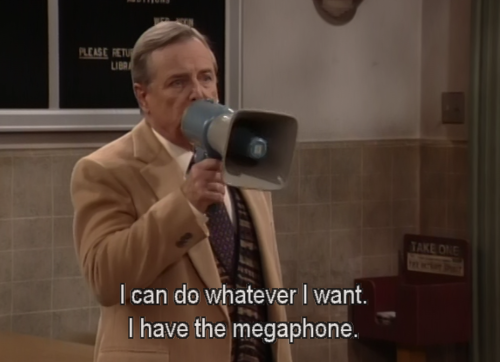 | |||
| (instead of a megaphone substitute chalk) |
Personally, as a new T.A. the words of George Herbert Locke resonated with me; this idea that we long to offer students “direct, personal, and often intimate intercourse with professors (or T.A.’s) of maturity and human sympathy”. I won’t speak for everyone but I know that I have always wanted to set up my course in such a way that I can become acquainted with each individual student, determine their proficiency level, and proceed to tailor instruction to meet their needs, all while maintaining a personal and respectful relationships. In other words, I fancied myself as heir to the role of Mr. Feeney (minus the creepy living next to my students and following them through life part). This of course presupposes an abundance of resources, the most important of which is time. As a T.A. I have 18 students, which may not sound like much, but getting to know them personally as well as where their proficiency levels are at in order to tailor instruction can be daunting, if not altogether impossible. Not to mention that I also have my own course work to attend to and (GASP!) a social life to maintain.
The article points to multiple “tension points” in American universities with regards to enrollment and the subsequent strategies (conferencing, writing lab/workshop, peer tutoring, etc.) that emerged to deal with the “hordes who come from high schools…lacking the background of cultured homes and the tradition of good English speech”, as Burges Johnson and Helene Hartley so eloquently observe. In general I agree with Johnson and Hartley in that it appears as though students are coming to college with lower writing proficiencies (I won’t label them as culture deficient hordes though) and that it seems unfair/unrealistic that the responsibility of bringing their writing skills up to par should fall solely on the shoulders of an instructor that will usually only have them for one semester. How much can be achieved in one semester? To this I would say, “As little or as much as the student wants”. With all of the aforementioned strategies/tools available it seems to me perfectly possible that a student could significantly improve their skills. If students could only analyze what their own shortcomings were regarding writing and seek to improve them we instructors could go about helping them succeed. In this way conferences would be very beneficial; even if students did not have the vocabulary to voice their issues in a one on one conference these issues can be overcome, but of course all of this is predicated on student effort. Unfortunately, rhetoric courses are not on the top of the interest list for most of our student body who would rather focus on their science courses. Bearing all of this in mind I think am most in agreement with Donald Murray in that “his teaching role is even less active and much more a mirror for students to see their intent, their needs, their problems.” At the very least after having read this article I don't feel bad about not being able to hold 18 hands at the same time.
Lerner, Neal. "The Teacher-Student Writing Conference and the Desire for Imtimacy." College English 68.2 (2005): 186-208. Web
No comments:
Post a Comment